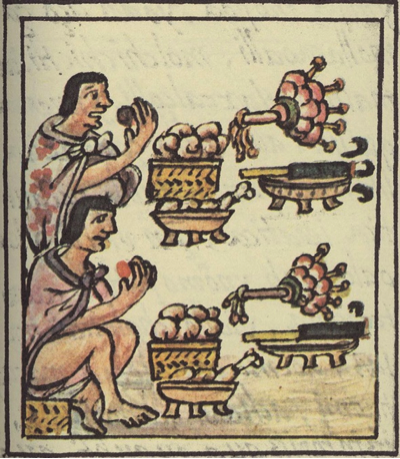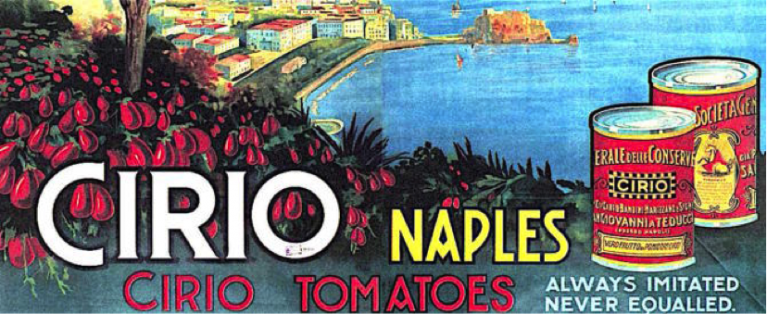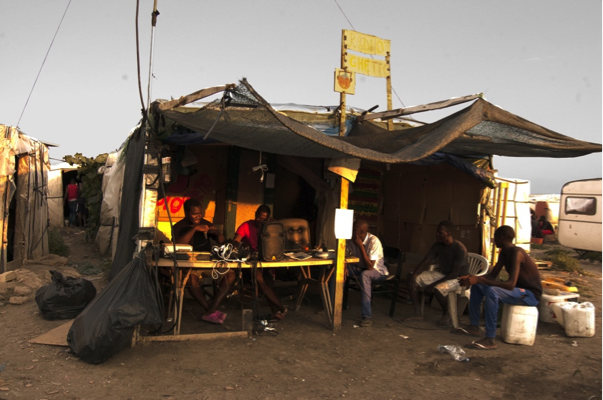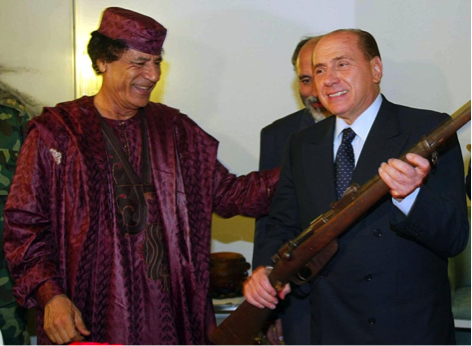Speciale
Radio Ghetto
1540: Spaniard Hernán Cortés returns home, bringing some specimens of xitomatl (large tomatl), a common vegetable in Aztec culture.

Aztec men at a banquet. Florentine Codex, late 16th century.
The plant was initially used in Spain and Naples, at the time a Spanish possession, for ornamental purposes in vegetable and flower gardens. In 1544, Italian humanist and physician Pietro Andrea Mattioli (1501-1578) classified the species of Solanum lycopersicum as poisonous, while admitting that in some regions its fruits are eaten after being fried in oil. In the sixteenth and seventeenth centuries, alchemists attributed mysterious aphrodisiac powers to these fruits, so much so that the names given to them in several European languages refer to love: love apple in English; pomme d’amour in French; libesapfel in German; pomo d’oro in Italian. Who knows what the names are in Chad, the Ivory Coast, Nigeria, Burkina Faso, Benin, Mali, and Senegal? Tamatim? Tomate? Tomati? Kamaate? Tamaate?
 Cirio Tomatoes. Always imitated. Never Equalled.
Cirio Tomatoes. Always imitated. Never Equalled.
2012: In March, tomato seeding started in the countryside surrounding Foggia, Italy. In May, together with the harvest, a routine exploitation began of dozens of immigrants who would be paid around €3 for each case of harvested tomato, (more or less?) “under the table.” The “code of complicity on the harvest slaves” in 24,000 micro-farms in the countryside of Foggia was architecturally translated into a constellation of ghettos, areas inhabited by the labourers in Puglia. The creators benefitting from this neo-colonial and prison-like management of labourers were the producer organizations and large consortia, which were of course dual-linked to the large distributor organizations. In the fields between San Severo, Rignano Garganico and Foggia, the “Great Ghetto” was born in the late nineties, following the vacation of an abandoned sugar factory inhabited by foreign labourers working in neighbouring fields. Until its dismantlement in March 2017, the Great Ghetto housed about three thousand seasonal workers inside provisional shacks. It was in this “nowhere,” or invisible space in the geography of the Italian State, that Radio Ghetto was born in 2012, prompted by the organisation Rete Campagne in Lotta: a radio project that gave a voice to the community living in the ghetto every summer from late July to the beginning of September. Following the fire and dismantlement of the Great Ghetto (where two Mali labourers died), the radio transmission equipment was moved to Borgo Mezzanone, an airstrip that had been part of a military airport used by the United States during World War II. The slum is adjacent to the Reception Centre for Asylum Seekers, with a fence criss-crossed with electricity and water cables going to the ghetto.

Radio Ghetto at Rignano Garganico. ©Ginevra Sammartino.
Radio Ghetto broadcast until 2016, mainly within the Great Ghetto of Rignano Garganico, and over time has sought to make its way to a larger audience through Radio Ghetto Italia: a weekly broadcast program from small radio stations in different Italian regions and on the web (RadioBarrio); along with Radio Ghetto Africa, a half-hour program in French which sheds light on present-day Europe and is broadcast in Morocco, Burkina Faso, Benin and Senegal.
The content of the Italian and French language broadcasts is not the same: there is a broader perspective in the transition to the second language. English, Wolof, and Barambà occasionally emerge, filling or opening gaps between speaker and listener. While blurring cultural boundaries, the radio gives a voice to those living in the Ghetto, bringing it into the homes of listeners. In The Expulsion of the Other, Byung-Chul Han imagines a future in which a new professional figure might emerge: that of the listener, whose earnings come from acknowledging and listening to the “Other.” For now, capitalism has not yet given us this joy, and Radio Ghetto can be freely heard but without payment to those working within it. It brings with it a scrap of comfort, but also a sense of community different from that found in the so-called civilised society.
During radio broadcasts, directly handled by those who live in the community surrounding Foggia, the living conditions and the difficulties of agricultural labour are discussed. They inform those who have just arrived about Italian laws and rights. There are discussions of illegal hiring, they record speeches, listen to music and radio news, and hold contests for rappers living in ghettos. The daily lives of speakers are shared, from the issues surrounding migration to daily life in the province, until the electric generators stop.
By doing so, “Tomato Radio” challenges media’s conventional view of the “black ghetto” as an emergence (while also hiding the mass of Eastern European workers), a mantra that has the power to cast light on those living an invisible life outside of the rules of citizenship: the so-called illegal persons.
Yet the concept of Agamben’s “camp,” which the philosopher presents as the nomos of modern society, is already hybridized and transformed here, just as in the rest of Italy. Alongside the new Shoah (which Franco “Bifo” Berardi referred to as “Auschwitz on the Beach” in his harshly-criticised and provocative performance at documenta14 (https://comune-info.net/2017/08/non-possiamo-tacere-davanti-alla-nuova-shoah/), there are in fact the second and third generations destroying this framework. There are black university students who go to Puglia to work seasonally, and there are those who have lost their job and are forced to settle for a compromise, although possessing regular residency documents. The Blacks who accompanied Otto Penzig on Monte Sabber, less exotic than a Dodonaea viscosa, are now our neighbours. Among the ruins of southern Europe, however, there are still signs of pioneering colonialism; like about a month ago while I was going up the escalator of Central Station and saw Valeria Marini insulting her black luggage carrier.
I wonder if there will ever be a time for Italian elementary students to start learning Africa's history and geography, and the reasons why there is “no life in Lybia,” perhaps with a picture of Enrico Mattei hanging over the blackboard. (In November 2009, in the book Il mare di mezzo, Gabriele del Grande told the story of Abdu Wali, a Somali prisoner held in Gatrun prison after being intercepted by the “Italian boat.” All of the men on the inflatable dinghy stopped by the Italian boat were Somali. “Three spoke in English and interpreted for the Italians. ‘No life in Libya,’ they said. We explained that we are Somali, that in Somalia there is war, and that in Libya they would arrest us. We asked for political asylum…”)
While leaning against a still-closed heater in the first cold of this fall, I think of the partnership between ENI and the Libyan National Oil Corporation for the exploitation of gas deposits in Libya. I wonder if in 2047, when this agreement expires, methane will still come first in the Mediterranean race between gas and barges, with tourists’ ships sharing the same stretch of sea serving pasta with tomato sauce.

October 28, 2002. Libyan leader Muammar Gaddafi gifts Berlusconi with the last Italian rifle (?) left in Libya, Tripoli (ANSA press agency).
One of Radio Ghetto Africa’s programs, broadcast in French in 2016 in the Rignano Garganico “Great Ghetto,” was devoted to The Illusion of Europe (L'illusion de L'Europe), or how the ideal represented by getting to the old continent can become a disappointment for those who leave Africa to reach the Eldorado of the north. Among the guests interviewed, Sissoko and Ibrahim, both from Mali, were part of the flow of life that crosses the camp. Their stories lay bare and expose, for listeners inhabiting both sides of the Mediterranean, the exploitation and isolation of those who have reached southern Europe.
Radio Ghetto transmits and archives a small part of the politics of exploitation, of mafia affairs and crime in the countryside surrounding Foggia. This is done thanks to the commitment and support of the inhabitants of all of the ghettos, along with the activists, volunteers and journalists who have chosen to devote their “free time” to record the invisible existence of those living in a state of exclusion.
Translated by Laura Giacalone.
Radio Ghetto Italia is broadcast by:
–Radio Black Out (Torino, 105.25 FM): Thursdays at 10:00
–Radio Beckwith (Piemonte, for frequencies visit the website): Mondays at 19:00
–Radio Fragola (Trieste, 104.5 – 104.8 FM): Thursdays at 14:00
–Radio Cooperativa (Veneto and Friuli Venezia Giulia, for frequencies visit the website)
–Radio Città del Capo (Bologna, 94.7 – 96.25 FM): Fridays at 20:00
–Radio Città Aperta (Roma, 88.9 FM): Fridays at 13:00
–Radio Ciroma (Cosenza, 105.7 FM)
–Radio Barrio (WEB): Tuesdays at 10:00
Radio Ghetto Africa is broadcast by:
–Radio Beckwith (Piemonte, for frequencies visit the website): Tuesdays at 14:30
–Radio Barrio (WEB): Wednesdays at 10:00
–Air Du Mboa (Morocco, Web radio); Wednesdays at 20:00, repeated Sundays at 20:00
–La Voix des Balé (Bale – Burkina Faso, 103.6 FM): Thursdays at 16:00
–Omega (Ouagadougou – Burkina Faso, 103.9 FM): Saturdays at 13:30
–Ouaga FM (Ouagadougou – Burkina Faso, 105.2 FM): from 5 October
–Lafia FM (Timbuktu – Mali, 94.6 FM): Sundays at 16:00
–Fraternité FM (Parakou – Benin, 96.5 FM): Wednesdays from 22:30 to 23:00
–Nafoore.fm (Kolda – Senegal, 89.7 FM): Saturdays from 17:00 to 18:00
–Seneweb (Senegal)







